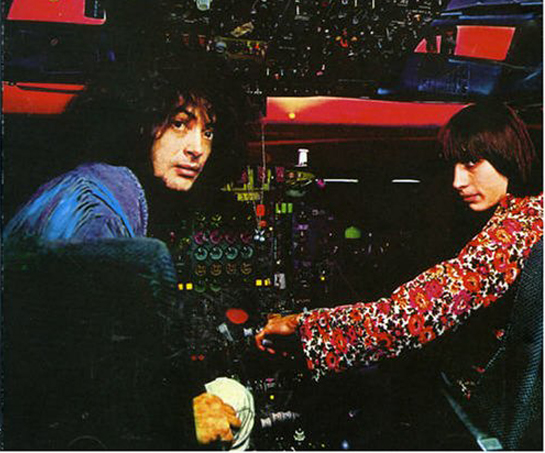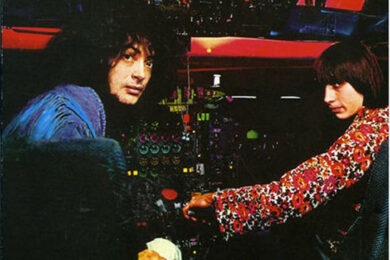Silver Apples sound like nothing else on earth. When Simeon Coxe III and Danny Taylor formed the band in 1967, Simeon’s idea of playing oscillators as instruments freaked out most of his former bandmates. This left only him and the like-minded Taylor to form a band. Drummer Taylor drove songs with a beat that was more moon-rover turboracer than mere kosmische motorik – imagine moon rock-crunching power toms and splashy dustcrater snares, faster than your adrenalised heartbeat in zero-G. The Simeon is an instrument made up of a bank of oscillators and all kinds of electronic guts whose workings only Simeon knows. It sounds like a yoked team of Theremins, and sometimes it squeals like electric bagpipes on the receiving end of a taser. I wouldn’t be at all surprised if someone diagrammed its circuitry and it looked like a sand mandala, because The Simeon makes sounds that are just as trancelike, from a source that is just as singular and extemporised.
It’s amazing Silver Apples are playing at all. Simeon and Taylor disbanded in 1970, after a photograph depicting a plane crash on the back of their second album led to lawsuits that bankrupted their label. They lost contact, only reuniting in the 1990s after some cult bootlegs of the group’s first two albums reignited interest. Silver Apples toured with an expanded band, and began writing and recording again. But then Simeon broke his neck in a car accident in 1999, and Taylor died of a heart attack in 2005, aged 56.
Now mostly recovered, Simeon’s working as a multimedia artist these days as well as recording music under the Silver Apples name, and this is his first UK tour for two years. I was lucky enough to ask him a few questions about his work. If you’re in London, go see them at Field Day on Saturday. If you’re not, they’re travelling the UK over the next few days. Just go.
Tell me about the Simeon. What made you think that oscillators would make a good instrument, and how did you know how to find all the wonky parts and wire them up together? Was there a lot of trial and error?
Simeon: Totally trial and error. I have no electronics background at all, but at least there was a naive but adventurous part of me that plunged ahead. I got the idea of an oscillator as a musical instrument rather than just a piece of electronic test gear when I heard a friend who was a classical composer playing one along with Beethoven. I thought, "Why not?" and tried it along with a rock record, and was forever hooked.
Have you changed any of its components over the years, or been tempted by any other instruments?
S: It’s always in a state of flux. I recently made a triggering device out of a scrap piece of PVC pipe, a door hinge and three pushbutton switches from Radio Shack. It totally changes the way I play ‘Gypsy Love’. I am not tempted by other instruments, it’s hard enough learning how to play this one.
Danny Taylor got what you were doing right away, but it seems like some more guitar-orientated musicians of the 60s were confused by it. Why do you think that might have been? Have listeners caught up?
S: Yeah, listeners, even guitar players seem to have caught up. In the beginning I think more traditional musicians were reluctant to embrace because they perceived us electronic freaks as a threat.
Silver Apples songs seem to be based around chants over oscillator drones, with odd key shifts or breaks of radio noise or blurpy sounds to break it up, and drums that are almost tribal. They feel trance-like. When you write, how do you get to that place where the drone and the chant flow together?
S: I haven’t a clue. I never try to analyze a piece of music in progress- just let it flow. I think if you analyze your art too much you block up the honesty of creative flow. Maybe there’s a primitive, instinct-driven part of us that loves to come out and play- all you gotta do is let it out and step back.
There’s a really stupid moral panic a UK tabloid (the Daily Mail) is trying to start about ‘i-dosing’, which is what happens when kids supposedly listen to tracks online through YouTube or download sites, and the drones and phase shifts, when heard through headphones are supposed to act like drugs (in a shocking and horrible way, of course.) Here’s a link about it. What do you think is going on here?
S: These "reporters" are probably the same people that "figured out" that kids were getting secret messages from drugged out rock musicians by playing their records backwards.
It seems like an obvious match, but how did you get in touch with Sonic Boom and Spectrum, and start working together?
S: We were on the same bill for a show in Boston and backstage Sonic ceremoniously gave me a little plastic toy silver apple that jingled when I shook it. We have been friends ever since. We sat in on each other’s sets and vowed to record when the opportunity arose.
Bootlegs are a double-edged sword. The TRC bootlegs in the mid-90s meant your music was exposed to a larger audience, and eventually led to legitimate re-releases. If it had happened today, someone would have put your album up on their website for people to download, and nobody would be getting paid What are your thoughts on bootlegs and the internet, and making a living as an artist?
S: It’s like trying to stop a wildfire with a water hose. I am resigned to the idea that music is like air- and once you release it, it’s pretty much impossible to control. I make my living off of live performances mostly.
You’ve made an amazing recovery from your 1999 car crash, but it seems like crashes interfere with your life at pivotal moments. You were hit by a car, aged 12, and that destroyed your trumpet and one particular musical path; and the plane crash photo on the back of Contact led to the downfall of your label. What are your thoughts on this? Coincidence or more?
S: Wow, I had never put it together like that. I suppose there are pivotal crashes of one kind or another in most people’s lives- and maybe it’s through working ourselves back up after an event like that, that we grow artistically and emotionally. They make us stronger.
Silver Apples play the Quietus Village Mentality Stage at Field Day this Saturday, July 31st. For tickets and more information, go here



